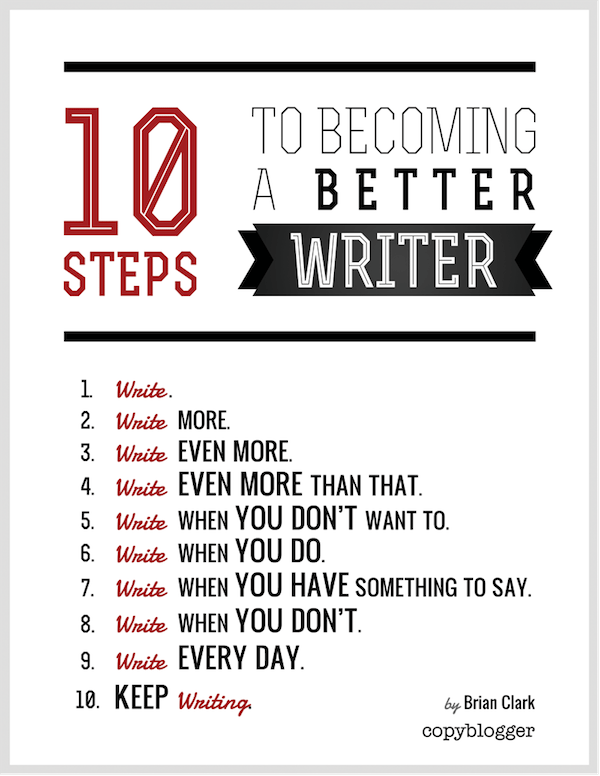Have you seen these rules before?

[Get more writing and content marketing tips from Copyblogger.]
Here’s Step #11: Don’t Write in a Vacuum.
It’s simple: if you want to get better — no matter what your experience level — you should also find and work with a critique partner or group.
The benefits include:
- Detailed constructive criticism and feedback on your work before you publish it.
- The opportunity to brainstorm and flesh out your ideas before you publish them.
- The opportunity to network and build professional relationships.
- Great accountability to your own writing goals.
All of which can shave months or even years off your learning curve as a writer.
The best writers have relied on the power of critique groups for eons.
Novelists, poets, screenwriters and yes, even those who write non-fiction, know that finding and working with a small cadre of like-minded writers can have a big impact on the work they share with the world.
I was — myself — part of a wonderful critique group in my early 20s. We wrote mainly short fiction and, over time, even decided to publish a collection of our best work. It was an experience second only to the workshopping that happened in some of my college-level writing classes.
My experience led me to ask: Why don’t bloggers do this, too?
You and I both know there’s a huge lopsided amount of advice out there for bloggers. Most of it revolves around tips for increasing engagement or traffic-building strategies.
The honest truth: if your writing sucks, no amount of website traffic is going to help you build your business.
In order for content marketing to work, it’s got to say something truly helpful for the reader. And if that content has any hope in Hades of being shared, it needs to be infused with a fresh perspective and/or a personality (hint: I mean yours).
The real answer is to improving your results is to write better posts. (NOTE: “Epic” isn’t required every time you publish, but you definitely want us to feel like the time we spend reading or watching your content has been worthwhile.)
My Answer: The Biz Bloggers’ Mastermind
Three times a year, I work with folks in small groups to help them write better blog posts. You can get a feel for what we do together here.
The reactions (and re-enrolls) prove my point: these kinds of groups work!
You can read more testimonials on the course description page.
How to Find or Start Your Own Critique Group
Obviously, you don’t need to join my group to take advantage of critiques. In fact, I encourage you to take the lead and form your own, or look for an existing group locally or online!
You could reach out to peers whose writing experience you feel matches and/or surpasses your own. They just need to be willing to meet on a regular basis and commit fully to the process.
Not sure whether to work locally or virtually? This post on The Writers’ Craft has some good advice.
Keep your group small. I recommend no more than six or seven people if you want to make sure you can give everyone’s work some quality time and attention.
Lay down some guidelines with your group. I generally follow mastermind practices in our meetings and also provide a checklist of what to look for while giving feedback. A good place to start in creating your own can be found on Writing Forward.
Of course, if you don’t have the time or energy to do all that, I’d LOVE to have you join us. Clickety-click on over and check out the details.
Now it’s your turn: have you ever participated in a writers’ critique group? What did you like? What didn’t you like? Or, if you haven’t yet joined a group, what are your biggest questions? Concerns? Chime in! I’d love to hear from you.
